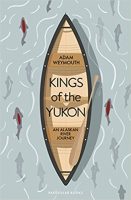Kings of the Yukon: An Alaskan River Journey
by Adam Weymouth
(Particular Books, £16)
 At dusk in winter from his barge on the River Lea in London, Adam Weymouth sometimes hears the honking of Canada geese, and is carried off to the Yukon, where the birds spend flightless weeks on islands during their summer moult. He heard them there two years ago as he paddled an 18ft glass-fibre canoe down the river, almost 2,000 miles through Canada and Alaska, to the Bering Sea. Reading his account of that journey, I found myself similarly transported. It’s so assured, so accomplished, that I found it hard to believe it was his first book.
At dusk in winter from his barge on the River Lea in London, Adam Weymouth sometimes hears the honking of Canada geese, and is carried off to the Yukon, where the birds spend flightless weeks on islands during their summer moult. He heard them there two years ago as he paddled an 18ft glass-fibre canoe down the river, almost 2,000 miles through Canada and Alaska, to the Bering Sea. Reading his account of that journey, I found myself similarly transported. It’s so assured, so accomplished, that I found it hard to believe it was his first book.
Not his first ambitious journey, though. Weymouth, 34, has walked across Scotland and — ferry-assisted over the Channel — from Salisbury to Istanbul. His passage down the Yukon was prompted by a court case he covered in Bethel, Alaska, in 2013, where 23 Yup’ik were prosecuted for flouting a ban on fishing for king salmon the previous summer. While biologists stressed the need for a stoppage — introduced following a sharp and inexplicable fall in salmon numbers — the Alaskan natives spoke of how the spirits of the salmon would be offended if fishermen didn’t fish. It wasn’t so much a trial as a clash of world views. Following further blanket bans on fishing in 2014 and 2015, Weymouth decided to canoe the river while the salmon were shouldering up it, in the hope that he could explain the decline in the kings and show how the lives of those who depend on the fish are changing.
Factors that might be shrinking the salmon runs include poor management, long-term climatic change, unintentional netting in the oceans, disease, or natural fluctuations. Weymouth has to admit that he can’t point to a key one: “There is only an alignment of weirdnesses, a constellation of hunches.” If he is frustrated in his first objective, he succeeds fully in his second, in his tracing of the relationship between fish and people, and “of the imprint that one leaves on the other”.
In European culture, the salmon’s uphill battle to the stream where it was birthed is seen as a story of rugged individualism; for tribes of the North American west coast, however, it embodies a selfless sacrifice for future generations. “The salmon are a giving people,” a Tlingit woman tells the author. “What a good example for [humans] to follow.”
In keeping with that, the people of the river, both natives and incomers, are generous to Weymouth and his partner — who figures fleetingly in the narrative — not only with insights into fishing, brining and smoking, but with handouts from their dwindling catch. For every fish camp in use, there are many more abandoned. Given all the regulations on who may fish and when, many are choosing not to bother. Dependence on food stamps and welfare is growing; alcoholism is rife, suicide commonplace.
The watershed of the Yukon is sparsely populated: a quarter of a person per square mile for a third of a million square miles. Weymouth’s story, though, is rich in characters. He meets no fewer than four men who make much of their living from having their frontier life documented on reality TV. One tells how he and his girlfriend, new to the river, had shot a moose, shared its flesh with their dogs, and later in the season got so hungry that they ate the dogs.
Weymouth also meets 84-year-old Mary Demientieff, who has fingers “clawed from a lifetime of needles and nets” but still spends every summer at fish camp. Raised by nuns because her father had died and her mother was a drunk, she was married off at 17 to a man 10 years her senior, a man she never loved but with whom she had 12 children. When one died, she adopted a boy whose own parents were drunks. The stories of these people are recounted in prose that’s almost novelistic in its elisions and fragmentary sentences, capturing the feel of conversations sometimes even without direct quotations.
At the centre of the book is the salmon, which nourishes not only humans but creatures from bears to beetles. Trees, too: “Imagine, if you like, the salmon swimming up the capillaries of the spruce and birch; it is not so far from the truth. Up to 70 per cent of the nitrogen in these forests had its origin in the sea. If you know the land well enough, you can gauge the state of the salmon run by the fecundity of the forest.” MK
This review appeared in The Daily Telegraph on July 7, 2018
